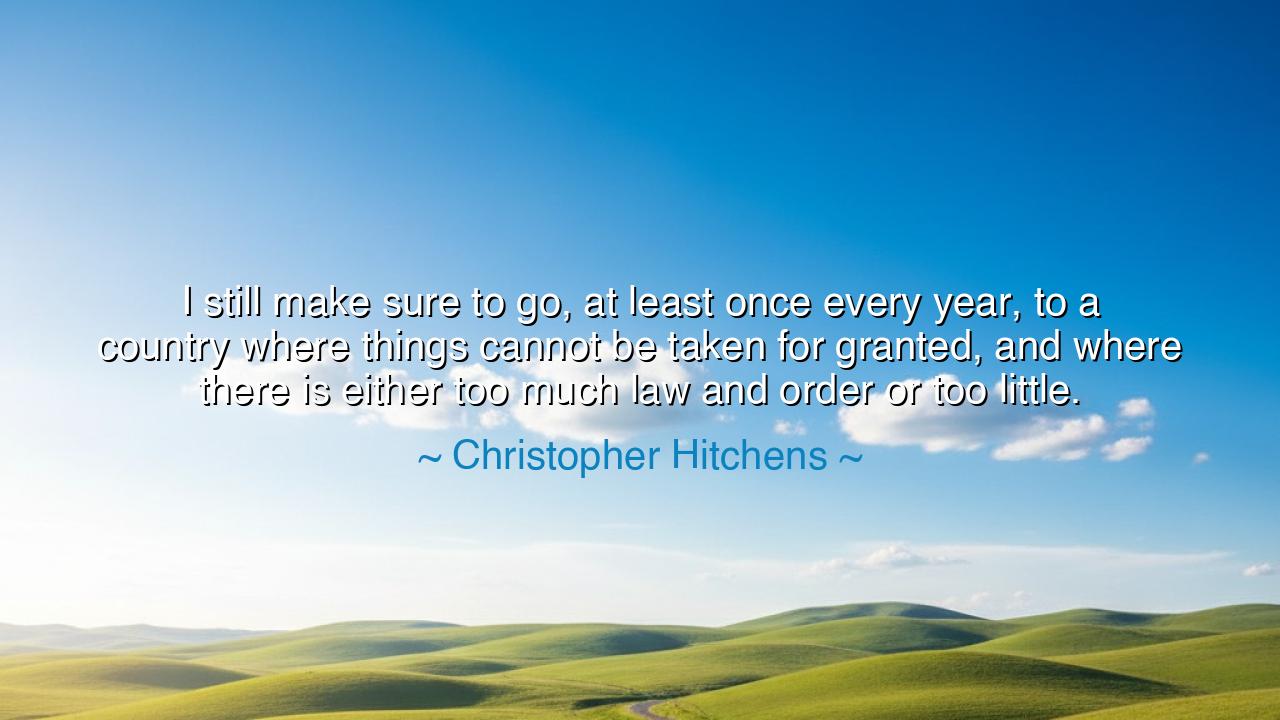
I still make sure to go, at least once every year, to a country
I still make sure to go, at least once every year, to a country where things cannot be taken for granted, and where there is either too much law and order or too little.






Hear, O seeker of wisdom, the words of Christopher Hitchens, who declared: “I still make sure to go, at least once every year, to a country where things cannot be taken for granted, and where there is either too much law and order or too little.” These words, though framed in the tongue of a restless traveler, hold within them an ancient truth: that comfort dulls the spirit, but exposure to the extremes of human existence sharpens the mind and purifies the soul.
To live always in safety, where life flows with predictable ease, is to risk forgetfulness. One begins to think that food on the table, liberty in speech, and peace in the streets are natural and eternal. Yet they are not. Hitchens sought countries where one felt the raw edge of life—where power suffocated the people with crushing law and order, or where the absence of order dissolved into chaos. To witness such extremes is to be reminded of how fragile human societies are, and how easily what is taken for granted can be lost.
The ancients knew this rhythm of strength through trial. Consider the Spartans, who sent their youth into the wilderness without shelter, forcing them to survive so they would never forget the harshness of nature. Consider also the Stoics of Rome, who practiced poverty for days at a time, eating coarse bread and wearing rags, so that wealth and comfort would never enslave their minds. Hitchens’ journeys echo this same wisdom: to deliberately leave comfort, to walk into a world where one cannot assume safety, is to learn resilience and humility.
History provides vivid examples of what he meant. In the rigid order of the Soviet Union, the individual was crushed beneath the weight of the state; even the smallest freedoms could not be taken for granted. In contrast, in failed states where law and order had collapsed, life became a desperate struggle against hunger and violence, with no shield of justice to protect the weak. Hitchens, by visiting both kinds of lands, sought to remind himself that civilization balances precariously between these poles, and that wisdom comes from seeing both tyranny and anarchy with one’s own eyes.
O listener, the deeper meaning is this: travel is not merely for leisure, for monuments and photographs. True travel is pilgrimage into the heart of human reality. To walk where law and order has become suffocating is to learn the value of liberty. To walk where chaos reigns is to learn the value of justice. To walk where nothing is taken for granted is to remember gratitude, to awaken courage, and to temper the heart against the illusions of comfort.
Therefore, learn from Hitchens’ example: do not spend all your days within the borders of ease. At least once in your life—or once in every year if you can—step beyond the gates of comfort. Go where life is raw, where the air is thick with uncertainty, where the balance of freedom and order tilts violently. You will return with eyes sharper, heart steadier, and soul more awake.
Practical wisdom follows: if you cannot travel far, then seek, even in your own land, the places where comfort ends and reality presses close. Visit the poor, speak with the oppressed, volunteer where chaos and suffering still dwell. Do not shut your eyes, for to live only among the privileged is to dream falsely. To encounter extremes, even briefly, is to remember the price of what you have, and the responsibility to guard it.
Thus I say to you: Christopher Hitchens’ words are not the boasting of a traveler, but the discipline of a seeker. For the wise man learns not only in libraries and salons, but in the streets of the oppressed and in the silence of the broken. Go, therefore, into the world where nothing is taken for granted, and return with the fire of gratitude, vigilance, and truth.






AAdministratorAdministrator
Welcome, honored guests. Please leave a comment, we will respond soon